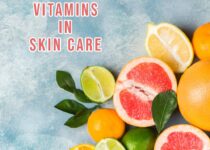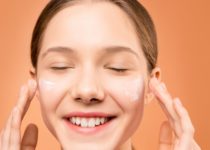Probiotics In Skin Care
Demystifying the Topic of Probiotics in Skin Care
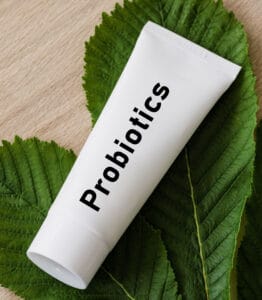
The use of probiotics has been the new hype in the field of skincare for the past few years. Their fast adoption has left many wonders on how effectively they work or what they are in the first place. Since skin breakouts are inevitable for some people, it is vital to have a working and safe solution to alleviate pimples, acne, and skin inflammations in general. Now, what really is Probiotics?
What Are Probiotics?
While this may seem like a new term for you, but you likely know its equivalents. Rhonda Klein, a certified dermatologist in Connecticut, defines probiotics as healthy bacteria that keep the skin’s microbiome happy hence solving several skin concerns. According to Dr. Francesca Fusco, a dermatologist in New York, probiotics work similarly to the digestive system’s bacteria.
What ties up this topic of probiotics in skincare and the gut system is the microbiome. The microbiome can be defined as a natural barrier against harmful bacteria thanks to the billions of microorganisms present.
For the skin, the microbiome is found beneath the top layer. By helping fight these unwanted bacteria, it helps manage skin pH and inflammation. Therefore, it is crucial to keep the microbiome nourished and balanced, a role done by probiotics.
Health Benefits of Probiotics
Let us first tackle probiotics’ health benefits before digging deeper into the mechanism of Probiotics in our skin. This is important to note, especially if you want to dig deeper and treat your skin from the inside out.
As mentioned above, probiotics are good live bacteria that live in your body naturally. Having an infection or a disease makes more bad bacteria in the body, and it is the job of the good bacteria to help in eliminating them, which by doing so, can return the balance of good and bad bacteria in the body. The body needs to catch up to the bad bacteria’s pace because there are many ways that our body can get harmful bacteria.
For example, when you are sick, your immune system would weaken, and the bad bacteria will take this opportunity to enter your body. The number of harmful bacteria is already increasing in that state. To overpopulate the bad bacteria, you must take probiotic-supplements that can add good bacteria in the body to fight them off.
Good bacteria keep you healthy by supporting your immune function and controlling inflammation. Because of probiotics’ ability to restore the natural balance of gut bacteria, they can also help the body’s digestive system. An imbalance means there are too many bad bacteria and good bacteria is insufficient. It can happen due to illness, medication such as antibiotics, poor diet, and more. Probiotics can also reduce the risk and severity of diarrhea from several different causes.
Probiotics don’t only help a person physically but also mentally. Some studies prove the link between gut health to mood and mental health. Studies found out that probiotic supplements can help treat some mental disorders through Bifidobacterium and Lactobacillus strains. These two can help aid anxiety, depression, stress, autism, obsessive-compulsive disorder, and improve memory.
Taking probiotic supplements for an estimated period of time can decrease depression levels and reduce C-reactive protein levels. Specific probiotic strains can help keep your heart healthy. They can do that by lowering cholesterol and blood pressure.
There are lactic acid-producing bacteria that can reduce cholesterol just by breaking down bile, a naturally occurring fluid made of cholesterol, in the guts. Breaking down bile can lower the cholesterol because when probiotics break them down, bile can no longer be reabsorbed, and it can no longer enter the blood as cholesterol.
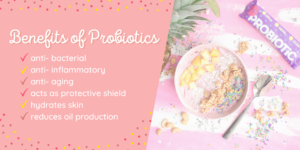
Mechanism Of Probiotics In Skin Care
For our skin, probiotics work wonders too. There are three main mechanisms in which probiotics act when applied on skin:
- Probiotics as antibacterial
Acne and pimples are caused by excess sebum, dead skin cells and bacteria clogged up inside your pores. There are ways that you can balance your oil production and maintain a clean surface. The best and effective practices are regular exfoliating and cleansing. However, there are instances that you can’t avoid getting bacteria into your pores because free radicals are everywhere. They come from air pollution, dust, and smoke, causing you breakouts.
Luckily, probiotics are highly antibacterial and can stop that from happening. When applied to the skin, probiotics produce antimicrobial peptides that kill unwanted bacteria. This helps keep acne and other bacteria-related skin problems at bay. Probiotics modify several factors in the pathophysiology of acne development and can potentially improve compliance as well. Probiotics have been shown to directly inhibit acne through the production of antibacterial proteins.
- Probiotics as an anti-inflammatory agent
Inflammation is when the skin experiences a rash that is usually stinging, burning, or itchiness when you touch them. They look smooth or raised like pimples and blisters. The skin will eventually turn red and will become painful to touch. This can cause scars since it can crack and bleed when you scratch them, leaving your skin rough and scaly. The harmful rays of the sun, such as UV rays, can also cause the skin to experience inflammation.
Probiotics can also counter inflammation. With their anti-inflammatory agents, probiotics skincare products soothe sensitive skin, reduce swelling, pimples, and skin breakouts that appear as inflammations. Probiotics accomplish this by repelling environmental conditions such as free radicals, harmful UV rays, and pollution. Studies have shown that applying probiotics to patients with inflammatory diseases such as ulcerative colitis can act as a treatment for an extended period of time.
- Probiotics as a protective shield
Do you want your skin to experience a calm and conducive environment exposing its positive features? Probiotics skin products perform this magic. By balancing microbiomes’ activity, probiotics provoke foreign microorganisms from inducing an immune reaction, leaving your skin relaxed and healthy.
When you apply good bacteria like a probiotic into your body, it can help the body control bad bacterias going to your skin. Probiotics form a shield-like barrier over the skin to prevent uninvited bacterias from penetrating the skin. Also, probiotics have an incredibly calming effect when treating skin problems.
Other routes of action by probiotics in skincare include:
- Reducing the amount of oil produced by the skin
Although the natural oils in your skin make skin younger-looking, it is one of the causes of skin breakouts, like acne and pimples. Acne occurs when the naturally produced oil in our skin tends to overproduce, causing clogged pores. Probiotics come to the rescue, reducing the overproduction of sebum. Which then minimizes skin problems. This is very ideal for oily skin types.
- Hydrating the skin
It is important to rehydrate your skin to look and feel fresh. If your skin is dehydrated, you will have a high risk of having dry and rough skin. Many probiotics in skincare products are also designed with moisturizers that help keep the skin adequately hydrated. This alleviates the uncomfortable and tight feeling of dry skin.
- Anti Aging
Since probiotics help in keeping your skin protected from UV rays, you are more likely to prevent the early appearances of wrinkles and fine lines. Also, probiotics can help in the production of collagen. We all know that collagen makes the skin look more youthful and radiant. It’s primary role is to keep skin’s elasticity and maintain smoothness and plumpines of the skin. With the presence of probiotics, you can reap its anti-aging benefits.
Is There A Way To Improve The Action Of Probiotics In Skin Care?
Probiotics in skin care products work best when used in combination with other products. One significant ingredient that enhances the activity of probiotics is prebiotics. Prebiotics enhance the growth of probiotics, helping them execute their vital roles effectively on the skin. It is also recommended to combine probiotics with proven acne fighters such as salicylic acid to improve their effectiveness.
It is also worth mentioning that as the probiotics break on the skin’s surface, they leave other materials such as peptides and vitamins that are beneficial for the skin. These are collectively known as postbiotics. Therefore, it is essential to let the probiotics present in skincare products to stay on the skin for a significant amount of time.
Manufacturers have considered all skin breakouts and skincare routines when making skin products with probiotics. With regards to skin breakouts, there are two main categories:
- Frequent breakouts- Skin types experiencing periodic breakouts such as acne, have one main problem- old blemishes. Therefore, it is recommended to use skincare products that contain hydrating probiotics to soothe irritated skin. Salicylic with azelaic acids can also help to fight acne and scrape off the old blemishes.
- Occasional breakouts- Probiotics products for this scenario should be used to prevent acne from occurring, moisturize the skin, and reduce sensitivity that often leads to redness. Here probiotics can be combined with essential oils such as tea tree oil.
Probiotics in skincare products are also intended for different beauty routines. These include facial cleansers, makeup removers, mist sprays, essences, makeup primers, and creams.
While there is always skepticism on new ingredients, having two sides of the argument is normal. There is no harm to give it a try if you are looking to try on new ingredients for your daily beauty routine. After all, probiotics are good bacterias that our body requires.
Side Effects of Probiotics
Like any other ingredient, probiotics also have their own side effects when not used properly. In some rare cases, probiotics may cause rashes or itchiness to the skin, depending on your skin’s level of sensitivity.
There are reviews from buyers who used probiotics, saying they experience itchiness and rashes as side effects. It is always a must to do a patch test first, especially if you have sensitive skin. Since sensitive skin is very vulnerable, it might worsen your skin’s condition instead of treating it.
If you already see a rash or feel severe itching, then you must stop using the probiotic. Before using the product, the first thing you must do is check the product’s labeling for any possible allergens. Consult a doctor if the rash is severe, persistent, or it accompanies other concerning symptoms.
If one type of probiotic doesn’t work for you, you can always try others from different strains. There are also alternatives available and present in many skincare products. If you prefer going for natural ingredients, you have Centella Asiatica, tea tree oil. For active ingredients, you can choose from Salicylic acid, Retinoids, Vitamin C, and more.
Where Can You Get a Good Source of Probiotics?
Most fermented foods are rich in probiotics such as kombucha, sauerkraut, pickles, miso, tempeh, kimchi, sourdough bread and cheese. The easiest way to incorporate a good source of probiotics into your diet is eating yogurt.
There are a lot of brands selling yogurt but when you choose one, you have to consider the amount of probiotics present in that yogurt. You can consult a nutritionist for this or you can look it up online. You can add yogurt unto your breakfast and midday salad, as an alternative for egg or potato.
Korean Products With Probiotics :
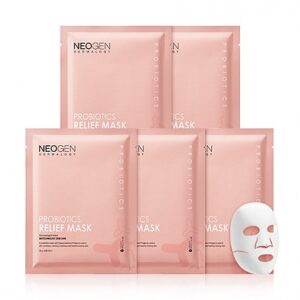
NEOGEN Probiotics Relief Mask contains Superprobiotics to control skin condition and create luminous healthy-looking skin.

Holika Holika Mechnikov’s Probiotics Formula Radiance Cream has a skin-friendly pH of 5.5 that refreshes and keeps the skin healthy.

Formulated with Superprobiotics, Neogen Probiotics Youth Repair Cream restores skin firmness, pores, texture, and complexion.

